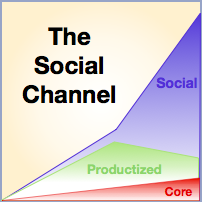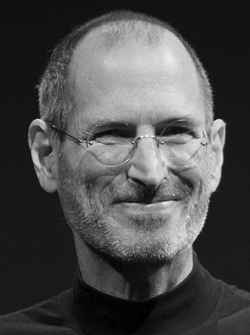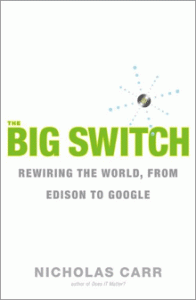Social Channel Two: Understanding the Social Channel of Value by Examining Its Precedents
 Meet the Social Channel of Value, the new arena where brands compete for user (customer, client) attention and loyalty. Product features are losing their ability to differentiate because they are copied so easily. Moreover, the Social Channel of Value will transform human decision-making, organizations and institutions because it digitizes sociality, a core human trait, and its power will dwarf the power of the product and the brand. CEOs, CMOs and CPOs have a very rare social business opportunity to harness the Social Channel ahead of competitors and remake their markets. These are strong statements, but bear with me and I think you’ll appreciate why I’ve made them. Meet the Social Channel of Value, the new arena where brands compete for user (customer, client) attention and loyalty. Product features are losing their ability to differentiate because they are copied so easily. Moreover, the Social Channel of Value will transform human decision-making, organizations and institutions because it digitizes sociality, a core human trait, and its power will dwarf the power of the product and the brand. CEOs, CMOs and CPOs have a very rare social business opportunity to harness the Social Channel ahead of competitors and remake their markets. These are strong statements, but bear with me and I think you’ll appreciate why I’ve made them.
The Social Channel is the Knowledge Economy‘s analog to the Industrial Economy’s assembly line, which led to today’s brands and mass-produced products. Where the assembly line made fabrication ten times more efficient, digital social technologies will boost human communication and sociality by an order of magnitude. The “Social Channel of Value” shows how product and service features will […]
Upgrading the Expert Role for the Knowledge Economy shows how knowledge workers can no longer seek refuge in their core expertise, and how to branch out.

“Experts” are regarded as the foremost authorities in their fields, the glib guru versions notwithstanding. An oft quoted maxim shows why: according to Malcolm Gladwell, for one, it takes 10,000 hours [of study, work] for most people to become expert in something.* On a related front, Naveen Jain posits that experts will be less likely to solve today’s toughest problems because their expertise has become a box around them. All those degrees or promotions within the organization have focused their minds but also closed out creativity. While commenting on his post, I realized that redefining the expert would be necessary in the Knowledge Economy, so here I’ll offer some strategies and tactics for how to practice being an “expert” in the 21st century.
Notably, we can take lessons from experts and apply them to specialists, which are arguably less far along on the same vector—and more common.
[…]
 In Recruiting Reinvented, the CEO of Reppify, which advises firms on using social networks to find job candidates, shared several nuggets for candidates, with a glaring omission that I’ll reveal below. Keep in mind that the focus of the interview was on how firms could use social to up their game, so the nuggets went unnoticed, except over here! One of Reppify’s core offerings is advising firms to use social networks to discover and engage candidates, but without setting off any legal land mines. I’m assuming that Reppify, in addition to screening candidates for clients, creates templated workstreams for their clients to improve recruiting while reducing risk. In Recruiting Reinvented, the CEO of Reppify, which advises firms on using social networks to find job candidates, shared several nuggets for candidates, with a glaring omission that I’ll reveal below. Keep in mind that the focus of the interview was on how firms could use social to up their game, so the nuggets went unnoticed, except over here! One of Reppify’s core offerings is advising firms to use social networks to discover and engage candidates, but without setting off any legal land mines. I’m assuming that Reppify, in addition to screening candidates for clients, creates templated workstreams for their clients to improve recruiting while reducing risk.
[…]
Steve Jobs Tribute: Behind the Fierce Competitor and Exacting Boss, the ardent desire to serve connected the creator, the visionary and the executive.
 Much has been written about Steve Jobs the creator, the technology visionary and the enterprise leader, but none of these personas entirely get to his essence. Steve Jobs was all these things, par excellence, but what deeply touched and inspired Apple’s customers and what made Steve bearable as a boss was an unconscious yet poignant feeling that he was there to serve people. He flew the flag of The Rest of Us. Unswervingly. Vehemently. Much has been written about Steve Jobs the creator, the technology visionary and the enterprise leader, but none of these personas entirely get to his essence. Steve Jobs was all these things, par excellence, but what deeply touched and inspired Apple’s customers and what made Steve bearable as a boss was an unconscious yet poignant feeling that he was there to serve people. He flew the flag of The Rest of Us. Unswervingly. Vehemently.
Without this higher calling, Steve would have been merely a successful tyrant. However, Steve’s commitment compelled thousands of brilliant and highly intelligent people to work for him and millions of customers to feel that Apple stood for something rare. Beige boxes and senseless software are optimized for profit, but Steve loathed mediocrity and its inherent compromises because they didn’t serve people, they acted at the expense of people. The desire to serve drove Steve Jobs, the creator, the leader and the innovator. Steve would […]
 As a speaker at the CIO Forum & Executive IT Summit this past week, I spent two days in focused conversations with enterprise CIOs. The summit is co-sponsored by SIM, TEN and ITEEX and is a relatively intimate setting as most attendees are CIOs, and no press is allowed. We spoke about what was top of mind for CIOs and their experiences with social business. It served as an excellent “current state of the CIO,” and I have some surprising takeaways to share. I’ll also offer a surprising prediction and social business guidance to CIOs. As a speaker at the CIO Forum & Executive IT Summit this past week, I spent two days in focused conversations with enterprise CIOs. The summit is co-sponsored by SIM, TEN and ITEEX and is a relatively intimate setting as most attendees are CIOs, and no press is allowed. We spoke about what was top of mind for CIOs and their experiences with social business. It served as an excellent “current state of the CIO,” and I have some surprising takeaways to share. I’ll also offer a surprising prediction and social business guidance to CIOs.
Having advised CEOs, CIOs, COOs and CMOs on adopting disruptive technology at various stages of my career, I have a broad perspective of the enterprise and executive roles. From the mid 1990s through 2006, I focused on enterprise software and corporate strategy. In 2006, I launched CSRA to advise enterprises on social business strategy, and I’ve been working with CMOs, which has been personally rewarding as I have also led marketing several times in my career. For context, here are a few things that most executives don’t yet […]
Understanding Web 3.0 as Data: Reid Hoffman, Founder LinkedIn summarizes business opportunities and privacy threats of the emerging sea of social data as well as outlining Web 3.0 key concepts and importance.
 In addition to being the founder of LinkedIn, Reid Hoffman is a Valley insider with rich insight into technology trends, markets and building companies. His main message in this talk at South by Southwest 2011 was that the future was bearing down on us, and he prophesied that it would “arrive sooner and be stranger than we think.” In addition to being the founder of LinkedIn, Reid Hoffman is a Valley insider with rich insight into technology trends, markets and building companies. His main message in this talk at South by Southwest 2011 was that the future was bearing down on us, and he prophesied that it would “arrive sooner and be stranger than we think.”
He painted the context for his theme, “Web 3.0 as data,” with a simple timeline: […]
 Giving as Smart Business: Blake Mycoskie, Founder TOMS Shoes is a fantastic story and a smart business idea. Blake Mycoskie is a gifted storyteller in his own right, and, in this South by Southwest 2011 keynote, he entertained the audience with the story of TOMS Shoes while imparting a simple but profound principle of 21st century business: discovering the meaning and potential of giving. Here are the highlights of TOMS story, which will help you appreciate the context of the blockbuster business idea. Giving as Smart Business: Blake Mycoskie, Founder TOMS Shoes is a fantastic story and a smart business idea. Blake Mycoskie is a gifted storyteller in his own right, and, in this South by Southwest 2011 keynote, he entertained the audience with the story of TOMS Shoes while imparting a simple but profound principle of 21st century business: discovering the meaning and potential of giving. Here are the highlights of TOMS story, which will help you appreciate the context of the blockbuster business idea.
[…]
Curmudgeonly Looking into the Past to Divine the Future—That Nagging Privacy Issue—Debunking the Elephant
 The Big Switch is a valuable book that reflects what has become Nick Carr’s trademark role, heckling IT and Web enthusiasts, albeit from good seats. Carr seems to relish his role as “the fly in the ointment” of the idealistic IT-enabled world that Web missionaries espouse. Although this book has shortcomings, I recommend it for two reasons. First, Carr makes a convincing and useful argument that the “electrification” of business and society (the Edison part) has valuable lessons for the “computerization” transformation of business and society (the Google part) that is currently unfolding. This parallel provides context to think about some of the disruptions around your business, society and career. Second, Carr raises serious questions about possible privacy implications of computerization. He palpably weighs in on the dark side and seems to want the world to change course from the “googlization of life.” If you haven’t read The Long Tail, I would read these books in proximity because they are very complementary and both quick, important reads. The Big Switch is a valuable book that reflects what has become Nick Carr’s trademark role, heckling IT and Web enthusiasts, albeit from good seats. Carr seems to relish his role as “the fly in the ointment” of the idealistic IT-enabled world that Web missionaries espouse. Although this book has shortcomings, I recommend it for two reasons. First, Carr makes a convincing and useful argument that the “electrification” of business and society (the Edison part) has valuable lessons for the “computerization” transformation of business and society (the Google part) that is currently unfolding. This parallel provides context to think about some of the disruptions around your business, society and career. Second, Carr raises serious questions about possible privacy implications of computerization. He palpably weighs in on the dark side and seems to want the world to change course from the “googlization of life.” If you haven’t read The Long Tail, I would read these books in proximity because they are very complementary and both quick, important reads.
As […]
Regina Herzlinger Keynotes Chicago Healthcare Executives Forum 35th Anniversary
Five-Point Prescription for U.S. Health Care—Involving Patients
 CHEF Chicago’s hospital executives listened raptly to Dr. Regina Herzlinger‘s impassioned message for transforming U.S. health care at their 35th anniversary celebration this month at the J.W. Marriott in Chicago. Dr. Herzlinger is respected and renowned for her message, so there were few surprises. The most distinctive element of her point of view is her strategy for taking a retail-led approach to transforming health care. She is very market- and consumer-focused, which is refreshing because it relies on the market and customers at least as much as the government. “Who Killed Health Care?” is her latest book, and she is a regular advisor to federal and state government officials. CHEF Chicago’s hospital executives listened raptly to Dr. Regina Herzlinger‘s impassioned message for transforming U.S. health care at their 35th anniversary celebration this month at the J.W. Marriott in Chicago. Dr. Herzlinger is respected and renowned for her message, so there were few surprises. The most distinctive element of her point of view is her strategy for taking a retail-led approach to transforming health care. She is very market- and consumer-focused, which is refreshing because it relies on the market and customers at least as much as the government. “Who Killed Health Care?” is her latest book, and she is a regular advisor to federal and state government officials.
[…]
 2011 Social Business Predictions and Recommendations describes current social business adoption and advices firms and people how to get ahead. 2011 Social Business Predictions and Recommendations describes current social business adoption and advices firms and people how to get ahead.
2011 will be remembered as the year “social media” fell by the wayside, strategy became a recognized prerequisite for serious efforts, and “social business” began displacing it in boardrooms’ mindshare. “Social media,” which usually tries to use social technologies to talk at people, has been the predominant “first use” of socialtech because marketing drives most social initiatives, and marketers “communicate,” i.e. push content, to their targets. When they “listen,” they use limited legacy processes such as focus groups, email marketing, data mining and online surveys. However, none of these scratch the real itch because they emphasize the company asking individuals structured questions; they don’t allow customer to customer interaction, which is ten times more illuminating because it is spontaneous and customer-centric.
Socialtech gets there, but marketers are ambivalent about it because it means a loss of control. And more profits and career growth for marketers, but they have to let go first. It’s a leap of faith, but […]
|
|
 Meet the Social Channel of Value, the new arena where brands compete for user (customer, client) attention and loyalty. Product features are losing their ability to differentiate because they are copied so easily. Moreover, the Social Channel of Value will transform human decision-making, organizations and institutions because it digitizes sociality, a core human trait, and its power will dwarf the power of the product and the brand. CEOs, CMOs and CPOs have a very rare social business opportunity to harness the Social Channel ahead of competitors and remake their markets. These are strong statements, but bear with me and I think you’ll appreciate why I’ve made them.
Meet the Social Channel of Value, the new arena where brands compete for user (customer, client) attention and loyalty. Product features are losing their ability to differentiate because they are copied so easily. Moreover, the Social Channel of Value will transform human decision-making, organizations and institutions because it digitizes sociality, a core human trait, and its power will dwarf the power of the product and the brand. CEOs, CMOs and CPOs have a very rare social business opportunity to harness the Social Channel ahead of competitors and remake their markets. These are strong statements, but bear with me and I think you’ll appreciate why I’ve made them.

 In Recruiting Reinvented, the CEO of Reppify, which advises firms on using social networks to find job candidates, shared several nuggets for candidates, with a glaring omission that I’ll reveal below. Keep in mind that the focus of the interview was on how firms could use social to up their game, so the nuggets went unnoticed, except over here! One of Reppify’s core offerings is advising firms to use social networks to discover and engage candidates, but without setting off any legal land mines. I’m assuming that Reppify, in addition to screening candidates for clients, creates templated workstreams for their clients to improve recruiting while reducing risk.
In Recruiting Reinvented, the CEO of Reppify, which advises firms on using social networks to find job candidates, shared several nuggets for candidates, with a glaring omission that I’ll reveal below. Keep in mind that the focus of the interview was on how firms could use social to up their game, so the nuggets went unnoticed, except over here! One of Reppify’s core offerings is advising firms to use social networks to discover and engage candidates, but without setting off any legal land mines. I’m assuming that Reppify, in addition to screening candidates for clients, creates templated workstreams for their clients to improve recruiting while reducing risk. Much has been written about Steve Jobs the creator, the technology visionary and the enterprise leader, but none of these personas entirely get to his essence. Steve Jobs was all these things, par excellence, but what deeply touched and inspired Apple’s customers and what made Steve bearable as a boss was an unconscious yet poignant feeling that he was there to serve people. He flew the flag of The Rest of Us. Unswervingly. Vehemently.
Much has been written about Steve Jobs the creator, the technology visionary and the enterprise leader, but none of these personas entirely get to his essence. Steve Jobs was all these things, par excellence, but what deeply touched and inspired Apple’s customers and what made Steve bearable as a boss was an unconscious yet poignant feeling that he was there to serve people. He flew the flag of The Rest of Us. Unswervingly. Vehemently. As a speaker at the CIO Forum & Executive IT Summit this past week, I spent two days in focused conversations with enterprise CIOs. The summit is co-sponsored by SIM, TEN and ITEEX and is a relatively intimate setting as most attendees are CIOs, and no press is allowed. We spoke about what was top of mind for CIOs and their experiences with social business. It served as an excellent “current state of the CIO,” and I have some surprising takeaways to share. I’ll also offer a surprising prediction and social business guidance to CIOs.
As a speaker at the CIO Forum & Executive IT Summit this past week, I spent two days in focused conversations with enterprise CIOs. The summit is co-sponsored by SIM, TEN and ITEEX and is a relatively intimate setting as most attendees are CIOs, and no press is allowed. We spoke about what was top of mind for CIOs and their experiences with social business. It served as an excellent “current state of the CIO,” and I have some surprising takeaways to share. I’ll also offer a surprising prediction and social business guidance to CIOs. In addition to being the founder of LinkedIn, Reid Hoffman is a Valley insider with rich insight into technology trends, markets and building companies. His main message in this talk at South by Southwest 2011 was that the future was bearing down on us, and he prophesied that it would “arrive sooner and be stranger than we think.”
In addition to being the founder of LinkedIn, Reid Hoffman is a Valley insider with rich insight into technology trends, markets and building companies. His main message in this talk at South by Southwest 2011 was that the future was bearing down on us, and he prophesied that it would “arrive sooner and be stranger than we think.” Giving as Smart Business: Blake Mycoskie, Founder TOMS Shoes is a fantastic story and a smart business idea. Blake Mycoskie is a gifted storyteller in his own right, and, in this South by Southwest 2011 keynote, he entertained the audience with the story of TOMS Shoes while imparting a simple but profound principle of 21st century business: discovering the meaning and potential of giving. Here are the highlights of TOMS story, which will help you appreciate the context of the blockbuster business idea.
Giving as Smart Business: Blake Mycoskie, Founder TOMS Shoes is a fantastic story and a smart business idea. Blake Mycoskie is a gifted storyteller in his own right, and, in this South by Southwest 2011 keynote, he entertained the audience with the story of TOMS Shoes while imparting a simple but profound principle of 21st century business: discovering the meaning and potential of giving. Here are the highlights of TOMS story, which will help you appreciate the context of the blockbuster business idea. The Big Switch is a valuable book that reflects what has become Nick Carr’s trademark role, heckling IT and Web enthusiasts, albeit from good seats. Carr seems to relish his role as “the fly in the ointment” of the idealistic IT-enabled world that Web missionaries espouse. Although this book has shortcomings, I recommend it for two reasons. First, Carr makes a convincing and useful argument that the “electrification” of business and society (the Edison part) has valuable lessons for the “computerization” transformation of business and society (the Google part) that is currently unfolding. This parallel provides context to think about some of the disruptions around your business, society and career. Second, Carr raises serious questions about possible privacy implications of computerization. He palpably weighs in on the dark side and seems to want the world to change course from the “googlization of life.” If you haven’t read The Long Tail, I would read these books in proximity because they are very complementary and both quick, important reads.
The Big Switch is a valuable book that reflects what has become Nick Carr’s trademark role, heckling IT and Web enthusiasts, albeit from good seats. Carr seems to relish his role as “the fly in the ointment” of the idealistic IT-enabled world that Web missionaries espouse. Although this book has shortcomings, I recommend it for two reasons. First, Carr makes a convincing and useful argument that the “electrification” of business and society (the Edison part) has valuable lessons for the “computerization” transformation of business and society (the Google part) that is currently unfolding. This parallel provides context to think about some of the disruptions around your business, society and career. Second, Carr raises serious questions about possible privacy implications of computerization. He palpably weighs in on the dark side and seems to want the world to change course from the “googlization of life.” If you haven’t read The Long Tail, I would read these books in proximity because they are very complementary and both quick, important reads. CHEF Chicago’s hospital executives listened raptly to Dr. Regina Herzlinger‘s impassioned message for transforming U.S. health care at their 35th anniversary celebration this month at the J.W. Marriott in Chicago. Dr. Herzlinger is respected and renowned for her message, so there were few surprises. The most distinctive element of her point of view is her strategy for taking a retail-led approach to transforming health care. She is very market- and consumer-focused, which is refreshing because it relies on the market and customers at least as much as the government. “Who Killed Health Care?” is her latest book, and she is a regular advisor to federal and state government officials.
CHEF Chicago’s hospital executives listened raptly to Dr. Regina Herzlinger‘s impassioned message for transforming U.S. health care at their 35th anniversary celebration this month at the J.W. Marriott in Chicago. Dr. Herzlinger is respected and renowned for her message, so there were few surprises. The most distinctive element of her point of view is her strategy for taking a retail-led approach to transforming health care. She is very market- and consumer-focused, which is refreshing because it relies on the market and customers at least as much as the government. “Who Killed Health Care?” is her latest book, and she is a regular advisor to federal and state government officials. 2011 Social Business Predictions and Recommendations describes current social business adoption and advices firms and people how to get ahead.
2011 Social Business Predictions and Recommendations describes current social business adoption and advices firms and people how to get ahead.